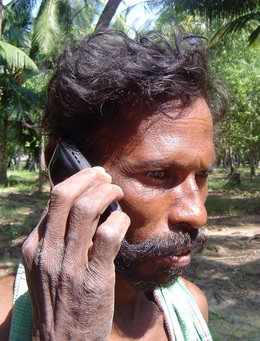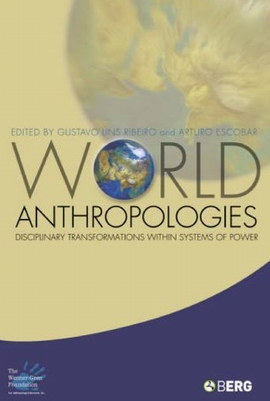What is the state of anthropology at African universities? African anthropology is interdisciplinary and focuses on solving problems like poverty, diseases and violence, Paul Nchoji Nkwi writes in the book World Anthropologies (download the book):
The West invented anthropology to study the “Other” and it defined the canons. But in developing economies, where resources are scarce, science has to be either useful or be gone.
In his very interesting text that is available online (Word-document), he describes the recent developments of our discipline in Africa and calls for a better cooperation between anthropologists in Africa with anthropologists in other parts of the world:
The European and American traditions of the discipline are distinct and the discipline surely deserves an African twist as well. It is time for the social sciences, including anthropology, across Africa to regroup and to face the challenges that confront us as a continent and as part of the human family: Disease, hunger, HIV/AIDS, ethnic wars, poverty … We need to look for answers to these scourges. It will be salutary for Africans to bring their own particular perspectives to all the social sciences, including anthropology
It is the applied option that dominates anthropology in Africa. Applied anthropology as the focus of academic work rehabilitated the discipline that has been discredited in post-colonial Africa because of its history as the handmaiden of colonialism:
African anthropologists grew up in societies that were either colonized or recently decolonized. Westerners initially controlled the production of anthropological knowledge and the result was functionalist studies. These studies were explicitly ahistorical and often myopic about colonialism. After the colonial period, the new nations of Africa dismissed anthropology both as a cultivation of primitivism and as an apologetic for colonialism.
Throughout the 1960s and 1970s African and Africanist anthropologists found it difficult to practice their profession openly, Paul Nchoji Nkwi writes. Anthropology took cover within African Studies programs, or anthropology institutes disappeared into sociology departments.
Some African anthropologists like Kwesi Prah (papers), Godwin Nukunya, Harris Memel-Fotê and Théophile Obenga, remained in Africa, while others like Adam Kuper, John Comaroff and Brian du Toit, Archie Mafeje, and Maxwell Owusu, left their countries “in search of more conducive environments”.
But by the 1980s, there was more and more demand for anthropological knowledge – mainly regarding development projects. Many projects had failed due to their top-down approach. A perspective from below was needed – an anthropological perspective. Also, a shift from hospital-centered to people-centered health care gave medical anthropologists a window of opportunity.
In 1987, the Pan African Anthropological Association (PAAA) was established. This was another event in the late 1980s and early 1990s that helped integrate anthropology into the discourse of development in Africa.
Anthropology, Paul Nchoji Nkwi writes, had to rediscover itself as a discipline that could help to solve problems:
During the first PAAA conference in 1989, many participants argued that addressing important human issues, such as the need for health care, the spread of famine, rapid population growth, environmental degradation, discrimination and violence against women, poverty, and ethnic violence would enhance the discipline’s tarnished image.
(…)
Since 1989, the PAAA has organized twelve annual conferences and a series of training workshops for junior anthropologists. The association has also worked hard to bring the discipline closer to other social sciences. The future of anthropology depends, we feel, on how well the discipline integrates with the other social sciences. For anthropology to attract funds it must take on, and bring a unique perspective to, research problems that are common to other social sciences.
(…)
Over the years, African anthropologists have worked closely with environmental biologists, organic chemists, economists, demographers, health providers, and others. This experience showed that multi-disciplinary work is mutually enriching since each discipline draws on its unique insights to attain a common goal.
At the University of Yaoundé, there were 525 students majoring in anthropology in the 2002-2003 academic year, the same number of students took it as their minor. Paul Nchoji Nkwi witnessed an “increased involvement of the social sciences in health, agriculture, animal, environmental, and population research programs funded by the government”:
Targeting critical areas such as general health, reproductive health, population growth, the environment, and agricultural development led to the design of courses in medical anthropology, development anthropology, and environmental impact assessment. Today, the University of Yaoundé-I has one of the most active and dynamic departments of anthropology in Central Africa, attracting students from the entire region.
African anthropologists want opportunities to work and earn their way – in partnership with their colleagues all over the world, he stresses:
To bring this about requires a series of small but doable changes in the formal academic training programs, grant administration procedures, and grant requirements to promote better partnership arrangements.
(…)
Strengthening the ability of Africans to organize and develop their own professional associations is a way to address all of these issues at once. Truly professional associations will link Northern and African anthropologists in a single intellectual, publishing, and teaching endeavor on a more equal footing.
>> read the whole text “Anthropology in a Post-Colonial Africa – The Survival Debate” by Paul Nchoji Nkwi (Word-document)
SOME LINKS RELATED TO AFRICAN ANTHROPOLOGY:
Pan African Anthropological Association (PAAA) (no updates since 2005!)
African Anthropologist (Journal of the Pan African Anthropological Association)
Etho-Net Africa (the new website of this network is no longer available)
African e-Journals Project
Nordic Journal of African Studies
African Studies Quarterly
African Journal on Conflict Resolution
JENdA: A Journal of Culture and African Women Studies
Afrikanistik online
Africa Writes
SEE ALSO:
How can we create a more plural anthropological community?
Book and papers online: Working towards a global community of anthropologists




